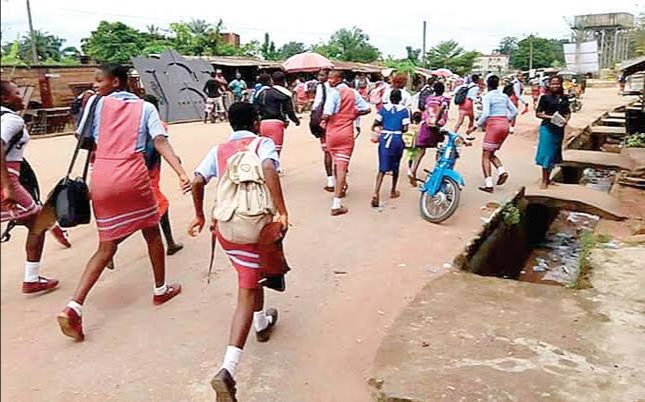Education
CAN warns 4 Northern states to reopen schools closed for Ramadan or face legal action

The Christian Association of Nigeria (CAN) has condemned the decision to close schools in Bauchi, Katsina, Kano, and Kebbi States for Ramadan, labeling it a violation of students’ rights and a concerning precedent for governance.
In a statement, CAN urged the state governments to engage with religious leaders, school proprietors, parents, and civil society organizations to revisit the directive and seek inclusive alternatives.
CAN President, Archbishop Daniel Okoh, emphasized that the association would not hesitate to seek legal remedies if dialogue fails or if students’ constitutional rights to education and freedom of conscience remain at risk.
The statement reads: “The Christian Association of Nigeria (CAN) views with grave concern the directives by the governments of Bauchi, Katsina, Kano, and Kebbi States mandating the closure of all schools—public and private—for up to five weeks to observe the Ramadan fast, effective from late February to early April 2025.
“While we honour the religious diversity of our nation and recognise the significance of faith, these decisions raise serious issues of equity, educational continuity, and the welfare of all citizens, regardless of their religious beliefs.”
CAN warned of the potential consequences of an extended school closure, especially in states already struggling with high rates of out-of-school children.
“Education is a fundamental right and the bedrock of progress. The closure of schools across these states, ranging from nursery to tertiary levels, for an extended period disrupts academic schedules and threatens the educational advancement of millions of students. These states—Bauchi, Katsina, Kano, and Kebbi—already face alarming rates of out-of-school children, averaging 44 per cent, according to recent data, far exceeding the national average. Such prolonged breaks risk deepening this crisis, undermining efforts to ensure access to quality education for all,” the statement added.
The association also expressed concern over the lack of extensive consultations before implementing the closures, noting that CAN leaders in the affected states had not been meaningfully involved in the decision-making process.
“Moreover, the apparent lack of broad consultation in Bauchi, Katsina, Kano, and Kebbi prior to these directives is troubling. CAN leadership in these states has not been adequately engaged, despite claims of stakeholder involvement. Policies impacting diverse populations—Muslims, Christians, and others—demand transparent, inclusive dialogue with parents, educators, religious leaders, and school proprietors. The absence of such engagement erodes trust and unity in our pluralistic society,” CAN said.
The statement further referenced global practices, pointing out that countries with deep Islamic roots, like Saudi Arabia and the UAE, adjust school schedules during Ramadan instead of completely halting academic activities.
“Globally, nations like Saudi Arabia and the United Arab Emirates—where Islam is central and Ramadan deeply revered—do not shut down schools for the entire fasting period. Instead, they adapt schedules, shortening hours or offering flexibility, to balance education with religious practice. If these Islamic heartlands can maintain this equilibrium, Nigeria’s northern states should strive for similar pragmatism. A month-long closure, or five weeks in Bauchi’s case, is excessive and departs from sensible precedent.”
CAN called on residents of the affected states to remain peaceful, emphasizing the association’s commitment to fostering interfaith harmony while standing firm on protecting the rights of students and families.
“We call on the people of Bauchi, Katsina, Kano, and Kebbi—Christians, Muslims, and all residents—to remain calm and peaceful as we address this matter. CAN is dedicated to promoting harmony across faiths, and we urge our members and the public to avoid actions that could heighten tensions.
“Yet, we cannot overlook the potential violation of the rights of students and families who do not observe Ramadan, nor the dangerous signal this sends for equitable governance.”
The association urged the governors of the four states to reconsider their decision and open dialogue with all relevant stakeholders.
“We therefore request that Governors Bala Mohammed, Dikko Umar Radda, Abba Kabir Yusuf, and Nasir Idris open channels of dialogue with key stakeholders—religious bodies, school owners, parents, and civil society—to reassess these directives and pursue inclusive solutions.
“Transparency is essential, and we expect these governments to act in good faith by promptly engaging all parties. The education of our children and the unity of our states are at stake.
“Should these rights face further jeopardy or dialogue fail to deliver justice, CAN is prepared to seek legal recourse. We will pursue restraining orders through the courts to safeguard the constitutional rights to education and freedom of conscience. Our pursuit of peace does not diminish our commitment to justice.
“Let us unite as Nigerians to forge a society where faith and progress harmonise, where no child’s education is compromised, and where every community is valued. We urge the governors to reconsider these policies in the spirit of fairness and national cohesion.”























